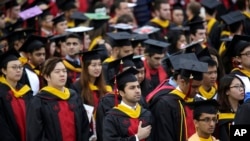In the United States, a college education has long been one of the best ways to become a member of the middle class.
A college degree usually leads to higher pay, stronger job security, a greater chance of home ownership and comparatively secure family life. These qualities have long been seen as worth the sacrifices often required. Those sacrifices can include the money spent paying off student loans and the years waiting for a return on one’s investment in higher education.
Yet U.S. college graduates are not as likely as they once were to feel they belong to the middle class. That is a finding of the 2018 General Social Survey, or GSS.
The Associated Press-NORC Center for Public Affairs Research and GSS researchers jointly examined the study. They found that 35 percent of college graduates described themselves as working or lower class. That’s an increase from 1983 when only 20 percent felt that way.
Not surprisingly, Americans without a college degree have long felt even less connected to the middle class. Last year, six in 10 of them described themselves as working or lower class, about the same as the percentage who said so in 1983. The study did not define middle class. Those questioned gave answers based on their own opinions.
The U.S. economy has been expanding for nearly 10 years. And the nation’s unemployment rate is at 3.8 percent. Yet the financial concerns that affect many college graduates point to the widening divide between the wealthiest Americans and everyone else.
Dan Black is an economist at the University of Chicago. He suggests that over time, this general trend could lead to delayed family formation, lower levels of spending by graduates and, eventually, slower economic growth.
“Concerns like this will definitely have impacts for the economy,” Black told The Associated Press.
Widening economic inequality
Released in March, the 2018 GSS survey found that as the country recovered from the 2008-2009 recession, many Americans have benefited. Both college graduates and those without degrees are earning more money now. But across age groups, a college degree has become less of a guarantee of rising to a better position in society.
Last year, the Pew Research Center reported that in 2016, a middle class household was one earning between $45,200 and $135,600 a year. It also reported that about 52 percent of American adults lived in middle class households.
Higher education still offers a path upward. But that path has been narrowed by student debt, rising housing prices and widening economic inequality.
Differences in pay go well beyond the divide between the top one percent of earners and everyone else. Differences are widening even within many career fields, including financial advisers, legal experts and medical doctors. The result is that what may seem like a middle class job description may provide a pay level more often linked with a lower middle class job.
Martha Gimbel is research director for the jobs website Indeed.com. Using information from the U.S. Bureau of Labor Statistics, Gimbel studied the divide between what the top 10 percent of a career field earned compared with the bottom 10 percent.
The top 10 percent of U.S. lawyers earned more than $208,000 last year. That amount of money makes the legal occupation look extremely well-paying. But the bottom 10 percent earned less than $58,200, which could make it difficult to repay law school debt.
“People might seek to become a lawyer, doctor or financial adviser because they see big salaries,” Gimbel said. “But there is a lot of range in what those workers make. They need to remember that they could be one of the unsuccessful lawyers or real estate brokers.”
Americans are also more likely than they were before the 2008-2009 recession to say they feel overworked. Eighty percent of college graduates say they work more than 40 hours per week. That is 10 percent higher than those who did not finish college. Graduates are also 10 percent more likely than non-graduates to say they have more work to do than they can complete.
Among college graduates who feel disconnected from the middle class is Justin Provo of Chicago. At age 28, Provo says student debt has blocked his move to becoming middle class. He borrowed a total of $58,000 to attend Roosevelt University in Illinois. In 2017, he earned a degree in economics and philosophy.
Now working for a loan servicing company, Provo says his earnings-based loan repayment plan is not enough to fully cover the interest on his loans. So while he is making monthly payments on his student loans, his debt level keeps rising.
“I’m making some progress, but I don’t feel like I’m getting anywhere,” he said.
The Federal Reserve Bank of New York reports that U.S. student debt now totals nearly $1.5 trillion. That is more than five times what it was in 2004. Researchers suggest that rising levels of student loan debt between 2005 and 2014 have prevented home ownership for about 400,000 young people. At the same time, some studies have shown that student debt has also delayed marriages and household formation.
Economists have noted that rising college debt has, in a way, become the cost of entrance into the job market. Nearly 80 percent of the 2 million overall job gains last year went to college graduates; just a third of U.S. adults hold a degree.
Soncia Coleman is a senior director at Young Invincibles. Her group works in support of the current generation of college-aged young people, often called millennials. Coleman said that millennials are facing difficulties like no generation before them. These difficulties are preventing them from reaching “what we all consider to be the American Dream,” she added.
“They need the education, but the cost to get it is astronomical,” said Coleman.
I’m Pete Musto.
And I’m Dorothy Gundy.
Josh Boak and Emily Swanson reported this story for the Associated Press. Pete Musto adapted it for VOA Learning English with additional information from the Pew Research Centers. George Grow was the editor.
We want to hear from you. How connected to the middle class do college-aged young people in your country feel? Write to us in the Comments Section or on our Facebook page.
________________________________________________________________
_________________________________________________________________
Words in This Story
degree – n. an official document and title that is given to someone who has successfully completed a series of classes at a college or university
graduate(s) – n. a person who has earned a degree or diploma from a school, college, or university
trend – n. a way of behaving or proceeding that is developing and becoming more common
impact(s) – n. a powerful or major influence or effect
benefit(ed) – v. to be helped
beyond – prep. more than something
broker(s) – n. a person who helps other people to reach agreements, to make deals, or to buy and sell property, such as stocks or houses
astronomical – adj. extremely large








